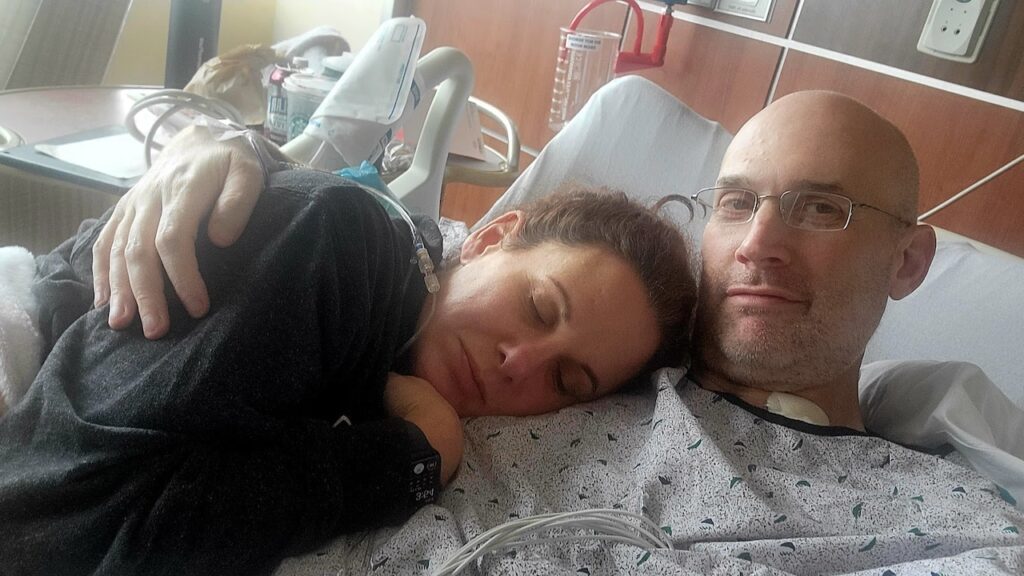With the murder of the UnitedHealthcare CEO sparking a debate on insurance companies denying treatment, a state lawmaker says it is time for New Jersey to give doctors the final say over which tests and treatment ought to be covered.
State Sen. Jon Bramnick, R-Union, joined at a press conference Monday by Brad Schnure, a 48-year-old former senior state employee who is battling stage IV lung cancer, said he has a solution to frustrating denials: Pass legislation that has languished since 2019 to ban the pre-approval or precertification of medical tests, procedures and prescription drugs already covered under health benefits plans.
Bramnick acknowledged the tremendous hurdles his bill (S2257), co-sponsored by Senate President Nick Scutari, D-Union, would face.
“I can understand my friends on the insurance side of the issue. They have a lot of power and influence over the Legislature. I am not optimistic,” Bramnick said. “It’s been difficult to get insurance companies to change their policies they think it would be extremely expensive if they let doctors simply make all the decisions.”
But screenings and other tests could save money by catching illness earlier, Bramnick said.
Schnure said had the New Jersey State Health Benefits Program under Horizon Health’s third-party administrator Evicore not denied a CT scan his specialist prescribed to search for the cause of a persistent cough in 2022, his lung cancer could have been detected a year earlier and given him a better chance to recover.
Schnure, the former Communications Director for the New Jersey Senate Republican Office described his experience in an op-ed column that recently appeared in the Star-Ledger and on NJ.com.
“Ultimately, I gave up trying to get that scan approved. I didn’t realize how serious those denials would prove to be until a full year later. In July of 2023, my health quickly deteriorated over several days. My wife rushed me to the emergency room as I gasped for breath,” Schnure wrote.
“Thankfully, CT scans in the emergency room don’t require pre-authorization. As a result of that scan, I quickly learned from a pair of attentive ER doctors that I had ‘metastatic lung disease.’ ”
The scan cost probably about $250, but Schnure said his treatment has run into the millions of dollars.
“I think that in recent years, reauthorizations and pre-approvals have gotten increasingly difficult to get. You are seeing in society a reaction to that. People are having a really hard time,” Schnure told reporters Monday.
Bramnick, a candidate for governor next year, opened the press conference with a statement condemning UnitedHealthCare CEO Brian Thompson’s violent death on the street in New York City. He said the murder is “the worst example” of what happens in a society dominated by an “us versus them” mentality.
“We not only have to condemn but be outraged by that kind of action,” he said.
But the conversation around getting denied for medical care should be channeled into something positive, they said.
Between what people spend on premiums and co-pays, only to be met with delays and denials, “The system has become kind of a mess for the average person,” Bramnick said.
As a member of the Senate Commerce Committee, Bramnick said his colleagues have tried to address the issue piecemeal, by banning pre-authorizations for a specific test.
In January, Gov. Phil Murphy signed legislation that mandates insurance companies render pre-authorization decisions within 24 hours for urgent cases and 72 hours for routine care in New Jersey. If a patient has received prior authorization from a former health plan, their new plan must extend coverage for 60 days until new approval is processed.
That law takes effect in January.
Ward Sanders, president of the NJ Association of Health Plans, the trade group representing managed care companies, called the new law a “landmark” piece of legisation.
“Our members are committed to helping patients get the right care, at the right time, in the right place. We support improving the prior authorization process for all, a process that will see significant changes as a result of the State’s landmark prior authorization law taking effect on January 1, 2025,” Sanders said in a statement.
The association stopped short of saying it would support Bramnick’s and Scutari’s bill.
“Plan sponsors expect health insurers to encourage effective, efficient, and safe services and prior authorization plays a role in those efforts,” the association’s statement said.
“There is room to improve the system and the best outcomes always happen when doctors and health insurers work together,” according to the statement.
The bill by Bramnick and Scutari, both attorneys who take medically related cases, call for something even broader.
State law would only affect state-regulated health plans, benefitting about one-third of the population.
Bramnick recalled how his secretary, who has since died, described her dealings with insurance companies as “more stressful” than the cancer.
Scutari did not respond to a request for comment.
Other states have addressed the pre-authorization issue on a limited basis, according to the American Medical Association, the lobbying group for physicians.
In Vermont, patients with chronic conditions do not have to get sign-offs for treatment if their condition has not changed. In Wyoming, a state law created a “gold card” program that exempts physicians from prior authorization when they have a track record of consistently being approved for certain procedures or medications for chronically ill patients.
Susan K. Livio may be reached at slivio@njadvancemedia.com. Follow her on X @SusanKLivio.

